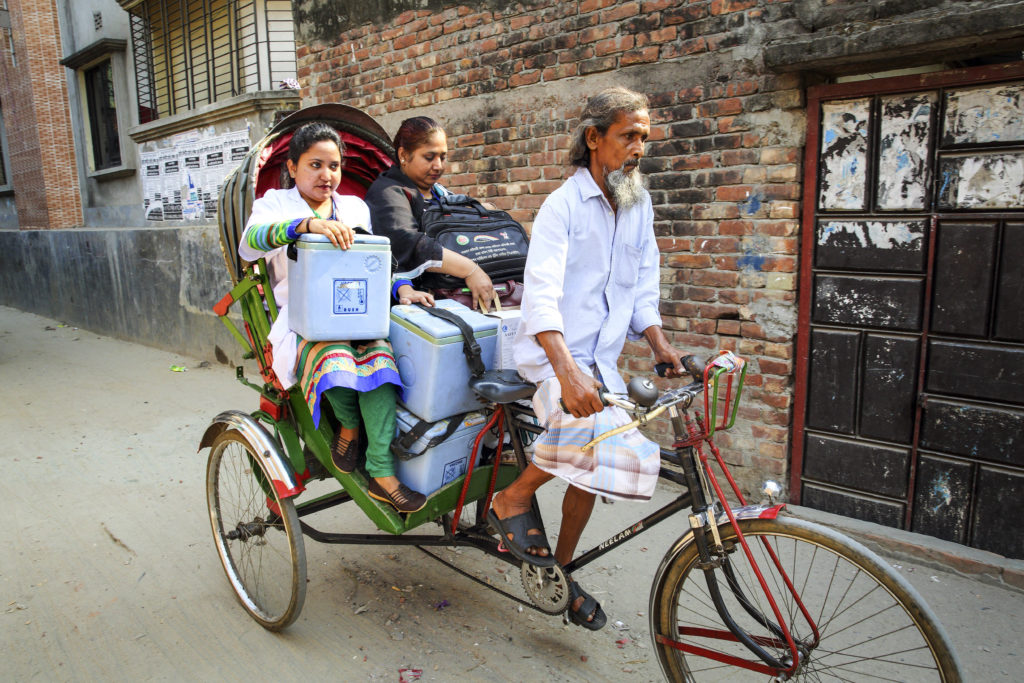As global leaders come together for the 74th UN General Assembly, a major focus will be the High-Level Meeting: ‘Universal Health Coverage: Moving Together to Build a Healthier World’ on 23 September. This is a global opportunity to mobilise the highest political support for the achievement of ‘health for all’ by 2030.

Universal Health Coverage – Unattainable Without Evidence
IDS, through its central role within the secretariat and executive of the Health Systems Global (HSG) membership society, will be participating in the High-Level Meeting and calling for governments and UN leaders to recognise that rigorous and engaged social science research is a foundation of the strong health systems required for Universal Health Coverage (UHC).
The IDS Health Systems Global team consulted the global networks 1,500 members from practice, policy and research to seek their views on the key messages and ‘asks’ that HSG should be communicating in the lead-up to and during UNGA74. Based on this valuable membership feedback and mandate, the IDS HSG team and HSG members and partners present in New York and via social media will be calling for immediate commitment from decision-makers to:
- Fund and support social scientists to generate evidence for policies and programmes in their contexts.
- Ensure that policies and programmes are monitored during implementation and rigorously analysed and evaluated to facilitate continuous learning of what is working and what isn’t.
- Commit to improving capacity to document, understand and learn from research and practice in all settings, especially where data is scarce and risks undermining the design, prioritisation and delivery of effective policies and programmes.
- Invest in the capacity of policymakers, researchers and practitioners to understand, create and share evidence through training and creating platforms for exchange and learning.
- Prioritise social science research funding through minimum funding thresholds, and the routine assessment of the capacity for investments in and the use of social science research.
On 26th September, HSG and the Alliance for Health Policy and Systems Research with the sponsorship of the Permanent Mission to the UN of the Government of Georgia will be co-hosting the side event: ‘Universal Health Coverage – Unattainable Without Evidence’.
Together with other national and international partners and members of HSG’s international network, we will call on UN Member States and agencies to build a base of what works, and implement strategies grounded in this knowledge.
Beyond academic research – partnerships for UHC
Evidence must be produced through academic research which is interdisciplinary – going beyond the technical aspects of health and bringing together medical and social sciences – as well as in partnership with communities and health practitioners who best understand the contexts and realities of their health and wellbeing. Their knowledge and experiences must be at the heart of decision making. The approach to tackling the Ebola outbreak in West Africa provides an important example of the transformative impact of local community initiatives, learning, and action. Amongst other things, the agreement to medically safe and culturally sensitive burial practices – supported by more respectful engagement from outside agencies – proved key to controlling the 2013-16 outbreak.
The Ebola outbreak example also highlights the importance of research partnerships that work across disciplines and sectors, are politically attuned and that are grounded in local realities while at the same time informing action at the national and global levels. For example, making the case not just for culturally appropriate real-time responses to the Ebola virus, but in mobilising longer-term national and global commitment to strengthening health systems to be more prepared and resilient in the face of future outbreaks.
UHC is a universal global challenge, and facilitating partnerships and mutual learning between countries is essential. So for example, an Economic and Social Research Council (ESRC) and Department for International Development (DFID) funded project, Unequal Voices: The Politics of Accountability for Equity in Health Systems, supported the mutual learning processes between Brazil and Mozambique on how better quality health services for all can be achieved by working closely with organisations that are engaged in efforts to promote social accountability through tools such as community scorecards, and through strengthening health oversight committees. IDS has also been involved in an initiative to facilitate learning between Chinese government officials and researchers and local government and NHS staff in the UK around meeting the health and care needs of an ageing population.
Building capacity to generate and act on evidence for UHC and tackling antimicrobial resistance
Governments and donors need to recognise that health practitioners, policymakers, and researchers are at the frontline of finding solutions to health systems challenges and implementing change. UHC will not be possible if governments and donors do not invest in their training, networks and capacity, so they can generate and act on evidence together. For example, researchers at IDS are currently exploring why guidance to prevent infections related to drug-resistant tuberculosis, which is estimated to cause one in four deaths attributable to AMR, is not being followed by clinics and health workers in South Africa. In such cases it might be that mutual learning, strengthened networks and capacity building are required alongside the more technical solutions and guidance.
For more information about the campaign and our presence at UNGA74, please email: [email protected]